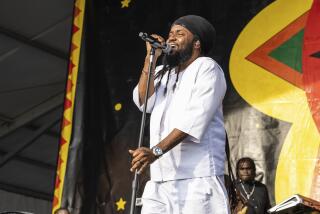Percy Heath, 81; Longtime Bassist for the Modern Jazz Quartet
- Share via
Percy Heath, the superb bassist who for more than 40 years provided the sublime underpinnings for the Modern Jazz Quartet, died Thursday of bone cancer at a hospital in Southampton, New York. He was 81.
Heath was the last surviving member of the quartet he helped found that became known simply as the MJQ. Playing in a restrained and conservative bop style that had a classical structure and formality, the MJQ’s sound was considered the epitome of sophistication. And the group’s members -- pianist John Lewis, drummer Connie Kay, vibraphonist Milt Jackson and Heath -- looked the part. Elegantly attired during their performances in suits or tuxedoes, they easily could have been mistaken for a classical string quartet except that their music really swung.
He and his brothers, saxophonist Jimmy Heath and drummer Albert “Tootie” Heath, made up one of the great families in jazz.
Percy Heath was born April 30, 1923, in Wilmington, N.C., the second of four children. Before Heath was a year old, he moved with his parents and older sister to Philadelphia. His father, an automobile mechanic, played the clarinet and his mother, a hairdresser, sang in the church choir. Heath’s first instrument was a violin, which his father gave to him when he was 8. He also sang in his family’s choir and on radio in local talent contests.
Drafted into the Army in 1944, he was assigned to the Army Air Forces and learned to fly P-4s and P-47s as a member of the Tuskegee Airmen. His class graduated in early 1945. He saw no combat. After the war, he decided that he wanted to go into music, so he took part of his military separation money and bought a stand-up bass.
Heath enrolled in the Granoff School of Music in Philadelphia, where he studied harmony and took bass lessons on the side. He soon was playing in leading clubs in the city with top names such as pianist Red Garland. He found a steady gig in the house band at the Down Beat Club.
Heath and his brother Jimmy moved to New York in the late 1940s. By 1950, they had found steady work with trumpeter Dizzy Gillespie. Jimmy played in Gillespie’s big band and sextet, and Percy in the sextet.
The MJQ had its genesis in the Gillespie big band. As Lewis told critic Leonard Feather some years ago, he and three other band members -- drummer Kenny Clarke, bassist Ray Brown and Jackson -- decided to form a group to try to create a sound that was not based on the standard themes of the day.
That group, which originally was called the Milt Jackson Quartet to please bookers who wanted a top name to promote, encountered some early criticism that it wasn’t playing true jazz. Heath joined the group when Brown left to play in his wife Ella Fitzgerald’s band.
The Modern Jazz Quartet was officially born in 1952. After a well-received European tour, it returned home and slowly caught on with American fans. Kay joined the group in 1955 when Clarke moved to Europe.
Lewis, the musical director of the group, told a reporter some years ago that he thought that the MJQ caught on because “so many small groups didn’t bother to do anything substantial in the way of arrangements. Our challenge was to change that, to blend composition, arrangement and spontaneity within the body of a single work.”
For Heath, nothing was more challenging than handling Lewis’ intricate compositions for the group. He said that early on he had to take lessons from bassist Charles Mingus for help with his intonation.
“I’d only been playing for four or five years when [Lewis] decided to make this group,” Heath told the San Jose Mercury News last year. “I had to learn a lot. He [Lewis] was my teacher for over 40 years, because he’d write what I couldn’t play, and I had to learn to keep up with him. It was amazing to be between him and Milt [Jackson] for all those years, listening to all that music. Some nights I thought I really shouldn’t have gotten paid.”
Challenging or not, Heath seemed at ease in the group’s formal but spontaneous context.
“Heath had a wonderful sense of self-possession, very easeful and confident even in the structure of the MJQ,” jazz critic Nat Hentoff said Friday. “He had presence and wit that came out in his playing. He found his vocation and was pleased to give other people pleasure.”
The group was a popular fixture on the American jazz scene until it broke up in 1974, with Jackson citing financial considerations. The split lasted until 1983, when the group reunited for a highly lucrative series of concerts in Japan. They played infrequently after the 1994 death of Kay, who was replaced briefly by “Tootie” Heath. Jackson died in 1999 and Lewis died in 2001.
After the MJQ disbanded in 1974, Heath joined with his brothers and launched the Heath Brothers band with pianist Stanley Cowell. Heath also started playing cello in performances, often switching from bass. The Heath Brothers, with their looser, more mainstream jazz sound, worked together off and on over the next two decades.
Bassist, composer and big band leader John Clayton on Friday recalled Heath as a diverse and accomplished player.
“Percy Heath really covered important styles in jazz that only a handful of bass players did,” Clayton said.
Clayton added that Heath was an excellent cellist who set the standard for doubling on both instruments.
In addition to his brothers, Heath is survived by his wife, June, and his sons, Percy III, Jason and Stuart.
More to Read
The biggest entertainment stories
Get our big stories about Hollywood, film, television, music, arts, culture and more right in your inbox as soon as they publish.
You may occasionally receive promotional content from the Los Angeles Times.










